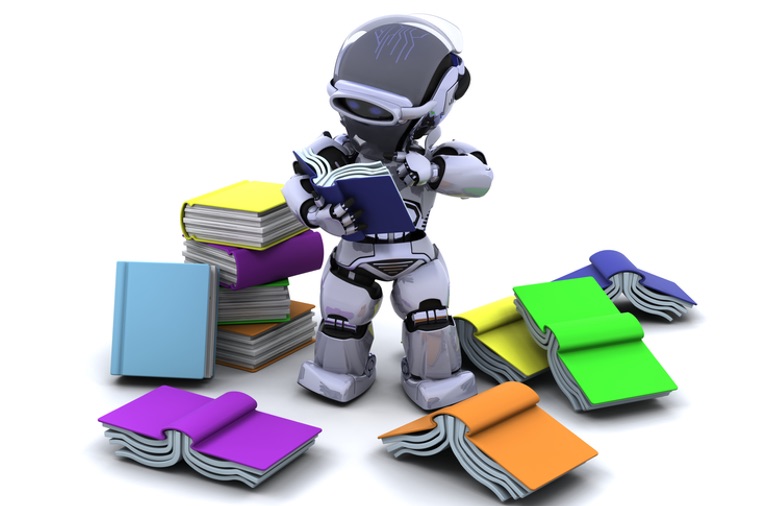
AI is revolutionising the writing process. Businesses, journalists, authors and other creative professionals can now use AI-powered tools more quickly and efficiently to write content.
Artificial intelligence can give writers unprecedented access to data and insights that can help them craft better stories.
The application of artificial intelligence in the writing process goes beyond just helping with grammar and spelling errors; AI can provide actionable insights into reader engagement, recommending topics based on what’s popular in your industry or genre, suggesting words that will make a piece easier to read, and even providing personalised writing coaching.
Using AI to write a book has several benefits for authors.
For one, it can help them write a novel more effectively and efficiently. AI technologies can be used to automatically generate valuable insights about the content of a book or research material, allowing authors to create and deliver high-quality work quickly.
AI using GPT-3 technologies can also help authors craft engaging content by aiding in the development of vivid descriptions, compelling characters and dynamic plotlines. AI technologies also allow authors to experiment with different styles and techniques while freeing up time to focus on other areas of the creative process.
Using these technologies, authors can create compelling stories that capture readers’ interest and drive them to act.
If you are intrigued about using AI software to assist you with writing a book, I recommend Jasper AI. It is the industry leader in AI writers, and they are currently offering 10,000 bonus credits if you sign up for a free trial with this referral link.
This article will discuss eleven tips for using AI to help generate content for your next book project.
Table of Contents
Can AI Write A Book?
The answer is both yes and no! AI writers can’t independently compose full-length books or novels as humans do, but they can use their built-in algorithms to help guide them in writing.
They can also analyse existing works to generate ideas they wouldn’t have had otherwise.
Ultimately, while AI book writers can output words and sentences that humans find creative and compelling, much of the real artistry behind books and novels still comes from human imagination and creativity.
Creating a good piece of literature isn’t just about finding the right words and structuring them into sentences – it’s also about conveying emotions, developing compelling characters and storylines, and connecting with readers emotionally.
AI novel writing software tools may be able to take some of the workloads off of authors’ hands, but it’s doubtful that AI will ever hold a candle to the creative genius of a human novelist.
Tips for Using AI Writing Software to Write a Book
When using AI to write a book, it’s essential to approach the task with the same level of care and dedication used for any other writing project. First, research the technology, software, and applications available to help you create your book.
Consider your book’s goals and ensure the AI fits its purpose well.
Then, set up an analytics system to track your project’s performance and gain insights into how its characters and story evolve with each iteration.
Consider how AI can generate unique plot points, storylines, dialogue, and settings to make your book stand out.
With some innovation and creativity, you can use AI to produce nuanced works of art that will captivate readers and leave them thirsting for more.
Tip 1: Research Ideas with an AI Writer
Writing a book can be an intimidating task. However, with the help of AI technology, it is now easier than ever to create a book from start to finish.
Consider using AI to help you research ideas before you begin.
Before writing your book, it helps to know what you want to include in your story. Researching relevant topics and gathering information can help make the writing process easier and give the writer other great ideas they may not have initially thought of.
AI tools like natural language processing (NLP) and text classification can help identify related topics and suggest similar ones that could add more depth or intrigue to your story.
Additionally, NLP can analyse different words used in the content and suggest alternative words or phrases that could provide clarity and improve readability. More on NLP in a minute …
Tip 2: Automate Outlines
An automated outline is created when software takes information from a text and organises it into a structure or list. This allows writers to generate ideas quickly and create detailed outlines that are otherwise difficult to do by hand.
An automated outline can help organise thoughts and track where specific topics fit the bigger picture.
Automated outlines also enable users to move pieces around quickly, allowing them to rearrange their thoughts without having to rewrite everything from scratch.
With this feature, authors can save time and easily experiment with different structures before settling on one they prefer.
Tip 3: Analyse Texts
Analyse Texts is all about using AI tools to break down your text into components that can be analysed to understand its structure and theme better.
Using an AI tool like NLP or Text Analysis, you can analyse texts to uncover patterns in the language used and the topics being discussed. This will help you spot themes that could be further explored in your writing or identify sentences or paragraphs that could benefit from editing or reworking.
With NLP, you can also use sentiment analysis which will allow you to measure and monitor how readers respond emotionally to certain parts of your book, giving you an idea of what works and what doesn’t.
Tip 4: Use AI to Help Find Inspiration for a Book
Writer’s block is real, and AI-based bots can be a great source of inspiration for a book, helping authors find unique plot twists and story ideas.
By entering words or phrases related to the book’s theme, authors can explore a world of possibilities and discover new ways to approach their writing.
AI-powered bots can also suggest characters, settings, and actions that could add depth and complexity to the story.
Additionally, using AI-based bots can help authors uncover plot holes and inconsistencies in their stories, aiding them in editing and revising.
AI-based bots may not be as creative nor intuitive as a human mind, but they can help authors unlock new ideas they wouldn’t have come up with otherwise.
Essentially, AI can help you write your first draft.
Tip 5: Improve Storytelling
Storytelling is a significant part of any book. It’s how authors engage their readers and draw them in, so ensuring your storytelling has the most impact possible is essential.
Fortunately, AI can offer writers some helpful tips for improving their storytelling.
Artificial intelligence can help authors craft stories that move readers emotionally by providing data on what elements create the most engagement from readers.
For example, AI-driven technology such as NLP or text analysis algorithms can analyse reader engagement data such as page views and time spent reading per page to help writers understand which parts of their story resonate the most with readers.
Tip 6: Use Natural Language Processing To Improve Your Writing
Natural language processing (NLP) can be a valuable tool for writers looking to improve their work. By analysing the structure and content of texts, NLP makes it easier to identify and correct mistakes and enhance the flow and rhythm of your prose.
For example, it could help you avoid repetition, analyze the readability of your text, or even detect signs of plagiarism.
Additionally, by using NLP to identify common themes and topics in a body of text, it is possible to understand what readers will likely find most engaging and valuable.
Furthermore, NLP can also identify areas where further research is necessary to provide factual accuracy.
By using these tools, writers can ensure that their work is more coherent, enjoyable, and factually accurate.
Tip 7: Take Advantage of Automated Editing Tools to Refine Your Work
In the digital age, automation is everywhere, and writing is no exception.
Use automated editing tools to ensure your work meets the highest quality standards. These tools can help you refine your writing and catch mistakes you may have missed.
They can also help you improve grammar, spelling, punctuation, syntax, and style.
Automated editing tools are an invaluable asset to any writer, helping them to create engaging and polished books.
With the right automated editing tool, a writer can rest assured that their book will be well-written, professional, and error-free.
AI tools like Grammarly and ProWritingAid use NLP to detect errors and suggest improvements. This quickens the editing process, allowing you to focus more on content instead of worrying about grammar, spelling, and punctuation.
These AI tools are also helpful for enhancing accuracy by flagging misused words or inconsistencies in tone.
In addition, they can provide insights into readability scores so authors can ensure their work is easy to understand for readers.
These automated editing features save authors valuable time and resources when seeking manuscript approval from editors or reviewers.
Tip 8: Leverage Voice Recognition Technology to Dictate Your Book
Voice recognition technology has revolutionized the way people write. With tools such as Amazon’s Alexa, Apple’s Siri, and Google’s Voice Recognition, authors can now use their voice to write and dictate their next book.
The ease of use and accessibility makes it a valuable tool for writers looking to save time. This technology offers an opportunity to develop ideas more quickly and easily convert dictation into text that can be edited later.
Authors can also use voice recognition technology to add nuance and depth to their writing, allowing them to express their ideas in a way that would be difficult to do on a keyboard.
With speech recognition technology, writing can become more natural and organic, allowing authors to capture the true essence of their creative vision.
Tip 9: AI Sentiment Analysis Tools for Books
Sentiment analysis tools are becoming increasingly popular in literature and book reviews. By using these tools, authors and publishers can understand how readers feel about their work, which can help them make better decisions about marketing and book production.
AI-based sentiment analysis tools are a great way to evaluate reader sentiment quickly and efficiently accurately. These tools use machine learning algorithms to analyze the text and classify it as positive, negative, or neutral.
By leveraging these tools, authors can get an unbiased and comprehensive assessment of their readers’ opinions.
This feedback can be used to inform decisions about marketing and book production, to ensure that readers are getting the best possible experience from the published work.
Tip 10: Check for Plagiarism
Checking for Plagiarism is an important step that should never be overlooked when it comes to writing. Plagiarism can have dire consequences, so it’s best to check your work and ensure you are not taking credit for someone else’s work.
Whether you are writing a story, a novel or any other creative work, running an anti-plagiarism scan on your finished product is always a good idea.
This will help you ensure everything you have written is your original work and that no part has been taken from another source without proper attribution.
Taking the time to do this extra step can save you from potential legal trouble.
Tip 11: Generate Covers
A great cover design can make your book stand out from other titles on the shelf – and AI can help you create that eye-catching design.
Whether you want something simple or an intricate illustration, AI tools such as Canva and Adobe Spark are available to generate stunning covers at the click of a button.
Furthermore, many online platforms offer free stock photos that could be used as part of your cover design if desired – giving you ample opportunity to find something unique and perfect for your writing project!
Should You Use an AI Writing Tool to Write Stories?
Using AI to write stories is a controversial topic. On the one hand, AI can automate mundane tasks such as researching and writing basic stories, freeing up time for more creative endeavours like crafting characters or devising plots.
On the other hand, many are concerned that using AI to write novels or stories will lead to a lack of originality and creativity in their work.
There is no definitive answer on whether you should use AI to write stories; it depends on the individual and what he or she would like from experience.
Ultimately, blending both approaches – using AI for basic storytelling tasks while reserving more creative elements for human writers – may be best to get the most out of any written work.
What is the Best AI Novel Writing Software?
When writing this article, Jasper.ai is the best artificial intelligence writing software that can help authors with books and novels.
Jasper.ai is a powerful AI writing assistant designed to help authors write better and faster. It uses natural language processing (NLP) and machine learning technology to suggest the best words, phrases, and concepts for a coherent and concise story.
With Jasper.ai, authors can create complete drafts of their books in less time while maintaining quality control over their work.
The software will help you write grammatically correct sentences, producing more accurate content without worrying about making mistakes.
If you would like to use the internet to promote your work, Jasper can also assist with creating optimised ads for SEO.
It also has built-in plagiarism detection that can alert authors if they use someone else’s work without permission.
In addition to these helpful features, Jasper.ai provides real-time feedback on how well a user’s writing is progressing and offers advice on improving it further.
Overall, Jasper.ai is an excellent tool for writers looking to save time while producing high-quality content for their books or novels.
Related Articles
Can AI Write Articles For You?
Can AI Write and Compose Music?
Conclusion
Writing a book is no small feat. It requires time, dedication, and a great deal of hard work. Fortunately, with the advancements in artificial intelligence, it is now possible to use AI technologies to help you write your masterpiece.
AI tools can provide new and experienced authors with the necessary resources to make their manuscripts more organised, comprehensive and professional.
Additionally, AI is becoming increasingly accessible and affordable for all authors. As technology continues to evolve, so too will the potential capabilities of AI-powered solutions.
Ultimately, authors must keep up with the latest advancements to leverage all available resources when crafting their next novel or nonfiction work.
In conclusion, leveraging AI in writing can provide countless benefits to a novelist, from improved accuracy and precision to increased creativity.
AI tools can create whole new worlds of possibility when developing plotlines and characters. Using AI to streamline writing allows authors to save time and produce more captivating content.
AI technology can help authors stand out, allowing them to craft new, innovative works that capture readers’ imaginations.
With these advantages in mind, it’s no wonder that so many authors are beginning to explore the potential of AI when writing their books.







